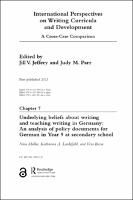Chapter 7 Underlying beliefs about writing and teaching writing in Germany
Proposal review
An analysis of policy documents for German in Year 9 at secondary school
Author(s)
Müller, Nora
Lindefjeld, Katharina
Busse, Vera
Language
EnglishAbstract
Assumptions about good writing and teaching writing have undergone various changes during the last century. This chapter summarises relevant changes in Germany's approaches to teaching writing and then uncovers underlying values and beliefs about writing in current German policy documents by focusing on Hauptschule Year 9, where students can achieve the first general education qualification that entitles apprenticeship admission. In particular, we analyse national Educational Standards and a sample of federal Curricula by drawing on discourses of writing (DoW) and learning to write outlined by Ivanič (2004). Although there are clear variations among federal states, a common denominator is the dominance of the genre and skills discourses. At the same time, there is a lack of consistent references to discourses relating to process-oriented writing and creativity. The sociopolitical and social practices DoW are completely absent. We show that the focus on genre and skills can partly be explained by Germany's educational legacy but also by the growing emphasis on output orientation in educational policy documents, which is accompanied by writing assessments focused on aspects of literacy that are easier to evaluate (e.g., reading and orthography). We argue that policy documents need to be more closely connected to values and beliefs of what constitutes good writing by current writing scholars.
Keywords
writing studies, writing development, cross-national writing research, school writing, curricular analysis, curriculum, assessment tools, national educationISBN
9780367508142, 9780367508166, 9781003051404Publisher
Taylor & FrancisPublisher website
https://taylorandfrancis.com/Publication date and place
2021Imprint
RoutledgeClassification
Education


 Download
Download Web Shop
Web Shop